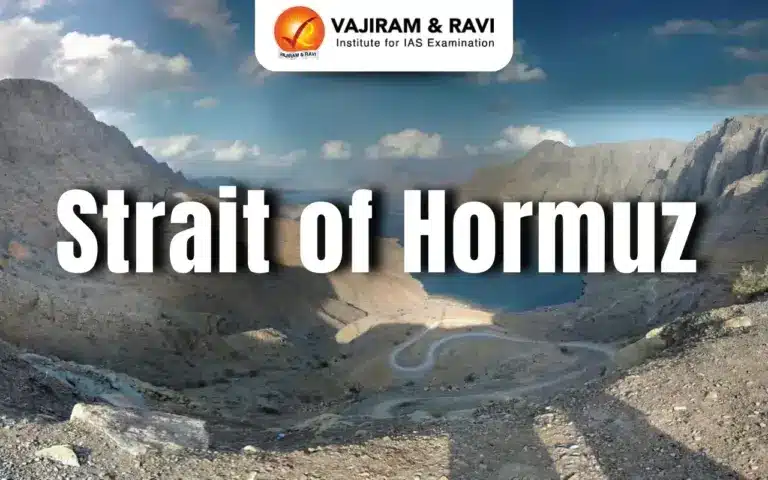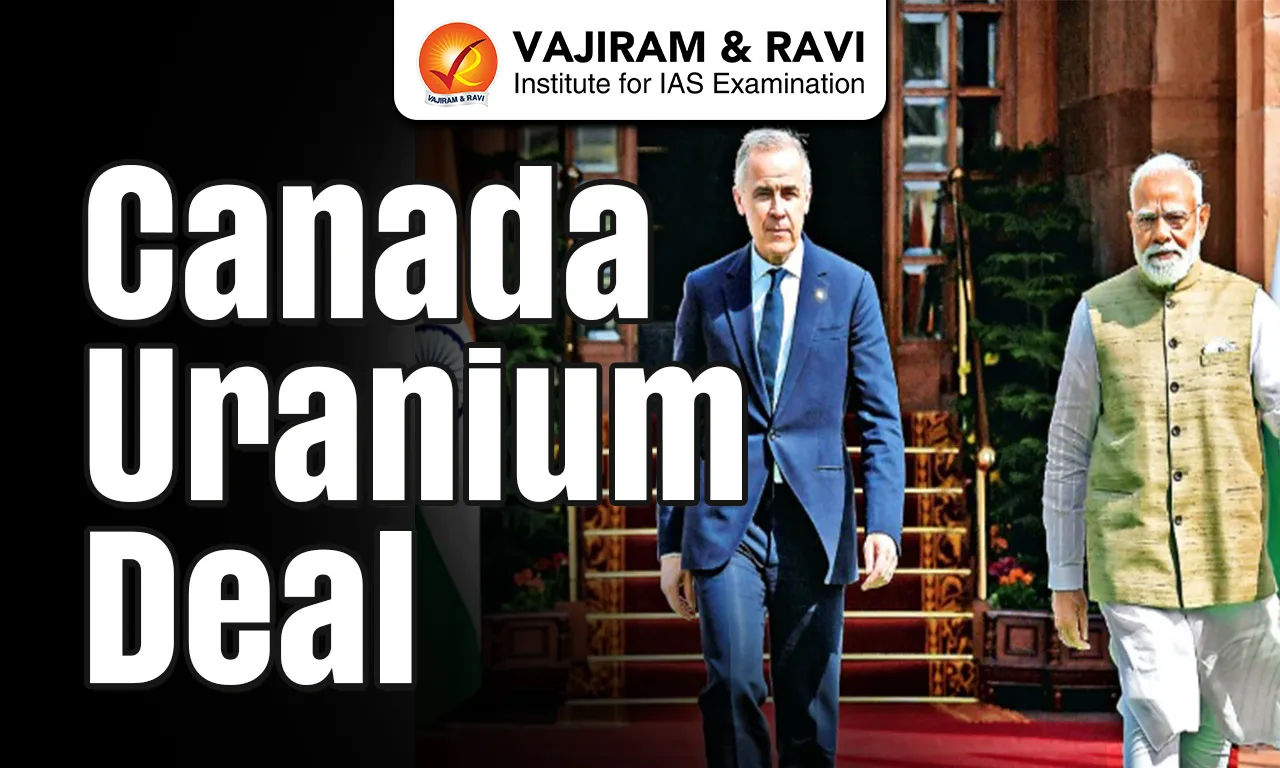Strait of Hormuz Blockade Latest News
- Iran’s Parliament has approved a proposal to close the Strait of Hormuz, pending a final decision by the Supreme National Security Council, following US strikes on Iranian military sites.
- While previously seen as unlikely, the threat now appears serious.
Strait of Hormuz
- The Strait of Hormuz is a narrow waterway that connects the Persian Gulf with the Gulf of Oman, eventually leading to the Arabian Sea.
- It serves as a crucial maritime passage for oil-exporting countries like Iran, Saudi Arabia, and the UAE. It handles a significant portion of the world’s oil trade.
- Its location in the territorial waters of Iran and Oman adds to its geopolitical sensitivity.
Geographic Vulnerability
- At its narrowest, the strait is just 33 km wide, with a 3 km wide shipping lane in each direction.
- This limited space makes it highly vulnerable to blockades or attacks on passing vessels.
Significance of the Strait of Hormuz
- The Strait of Hormuz is the world’s most important oil and LNG transit route.
- In 2024–25, over 25% of global seaborne oil trade and 20% of global oil and petroleum consumption passed through it.
- Additionally, 20% of global LNG trade, mainly from Qatar, also transited the strait.
No Sea Route Alternatives
- Geographically, there is no direct sea route alternative to bypass the Strait.
- Any disruption would severely affect global oil and gas flows, causing sharp price hikes and broader inflationary impacts.
Limited Overland Alternatives
- Saudi Arabia and the UAE have overland pipelines—the 5 million bpd East-West pipeline and the 1.8 million bpd Fujairah pipeline, respectively.
- However, these are insufficient compared to the 20 million bpd flow through Hormuz.
Higher Shipping Costs
Perceived risks in the region increase insurance premiums and security costs, making global shipping more expensive and further impacting global trade.
Iran to Block the Strait of Hormuz
Blocking or disrupting the Strait of Hormuz could involve laying sea mines, missile or bomb attacks on passing ships, detaining vessels, or launching cyberattacks on maritime systems.
Strategic and Diplomatic Constraints for Iran
- Despite repeated threats, Iran has never actually closed the Strait, even during wartime.
- Experts say such action would harm Iran itself, especially its oil exports to China—its main customer—and strain recent diplomatic gains with Saudi Arabia and the UAE.
Global Consequences of a Blockade
A blockade would not only disrupt global energy markets, especially affecting China (which sources 47% of its seaborne crude from the Gulf), but would also provoke a strong military response, likely from the US Fifth Fleet.
Impact on India
- India, the third-largest crude oil consumer, relies on imports for over 85% of its oil and about 50% of its natural gas.
- Nearly 47% of India’s May crude imports transited through the Strait, making it a lifeline for supplies from West Asian countries like Iraq, Saudi Arabia, UAE, Qatar, and Oman.
Price Volatility Is the Main Risk
- While India has diversified oil sources—including Russia, the US, Africa, and Latin America—a blockade of Hormuz would disrupt global supply chains.
- This, in turn, will cause oil and gas prices to spike, even if availability is not immediately compromised.
- A price surge would impact trade deficit, forex reserves, rupee value, and inflation, stressing the overall economy.
China’s Shift Could Intensify Demand Pressure
If Iran’s exports to China are blocked, Beijing may turn to other suppliers, increasing competition and further inflating prices, impacting India’s energy costs and broader economic stability.
Ripple Effects on Freight and Refining Margins
Disruptions would lead to higher freight rates and tanker insurance premiums, shrinking refinery margins across Asia, according to S&P Global’s analysis.
India’s Preparedness Amid Strait of Hormuz Tensions
Due to rising tensions in the Middle East, oil prices could temporarily rise to USD 80 per barrel, according to analysts.
India’s Key Energy Routes Remain Largely Unaffected
- Russian oil reaches India via the Suez Canal, Cape of Good Hope, or Pacific routes, bypassing the Strait of Hormuz.
- Qatar’s LNG supplies to India also do not rely on the Strait.
- Other LNG sources like Australia, Russia, and the US remain unaffected.
Diversification and Strategic Reserves Offer Cushion
- India can:
- Tap into its strategic oil reserves (9–10 days’ worth of imports)
- Increase imports from alternate suppliers like the US, Nigeria, Angola, and Brazil—though at higher freight costs
Potential Government Measures to Control Inflation
To offset rising domestic prices, the government may consider price subsidies, especially for diesel and LPG, to curb inflationary pressure.
Last updated on March, 2026
→ UPSC Notification 2026 is now out on the official website at upsconline.nic.in.
→ UPSC IFoS Notification 2026 is now out on the official website at upsconline.nic.in.
→ UPSC Calendar 2026 has been released.
→ UPSC Final Result 2025 is expected to be released soon.
→ Check out the latest UPSC Syllabus 2026 here.
→ Join Vajiram & Ravi’s Interview Guidance Programme for expert help to crack your final UPSC stage.
→ UPSC Mains Result 2025 is now out.
→ UPSC Prelims 2026 will be conducted on 24th May, 2026 & UPSC Mains 2026 will be conducted on 21st August 2026.
→ The UPSC Selection Process is of 3 stages-Prelims, Mains and Interview.
→ Prepare effectively with Vajiram & Ravi’s UPSC Prelims Test Series 2026 featuring full-length mock tests, detailed solutions, and performance analysis.
→ Enroll in Vajiram & Ravi’s UPSC Mains Test Series 2026 for structured answer writing practice, expert evaluation, and exam-oriented feedback.
→ Join Vajiram & Ravi’s Best UPSC Mentorship Program for personalized guidance, strategy planning, and one-to-one support from experienced mentors.
→ Check UPSC Marksheet 2024 Here.
→ UPSC Toppers List 2024 is released now. Shakti Dubey is UPSC AIR 1 2024 Topper.
→ Also check Best UPSC Coaching in India
Strait of Hormuz Blockade FAQs
Q1. What is the Strait of Hormuz? +
Q2. Why is Iran threatening to block it?+
Q3. How will a blockade affect oil prices? +
Q4. How is India vulnerable to this? +
Q5. Can Iran afford to block the strait?+
Tags: mains articles strait of hormuz blockade upsc current affairs upsc mains current affairs



















